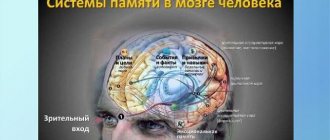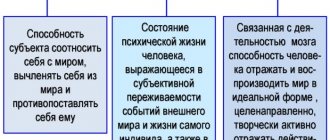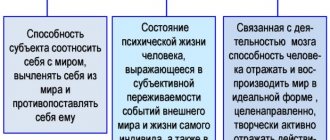Updated July 24, 2021 777 Author: Dmitry Petrov
Hello, dear readers of the KtoNaNovenkogo.ru blog. What is human consciousness?
Perhaps this is the voice of the soul, and then we will not cease to exist even after the death of the body. Of course, provided that the soul exists.
And if it lives thanks to the activity of the brain, then along with the cessation of the latter’s life, consciousness also disappears. This phenomenon is of interest to representatives of various scientific fields. What does humanity know about him today?
About consciousness in simple words
It has long been proven that only man is endowed with consciousness: it is his main distinguishing feature in comparison with other living beings. A flower does not think about what time to close its petals or open them - it does it at a certain hour, because it is in its DNA.
The lion will not be upset if he does not catch his prey and will not make Napoleonic plans to take revenge on the tiger with whom he recently fought. Aquarium fish do not remember what the food tasted like yesterday, and do not draw a mental image of it. All this is available only to a representative of the human race.
Thus, consciousness is a property of mental matter, with the help of which we can reflect reality.
A simple example: I see a cup in front of me. It is a beautiful red color. By the way, can I have some tea? The one I bought a week ago at the tea exhibition. The seller highly praised this variety. It's time to make sure of his honesty and brew this promising drink.
In one minute, a bunch of thoughts and images associated with them flashed through my head. I visited the past, future and present, experienced certain emotions and even sensations. This is what we call consciousness.
Consciousness can be compared to the wind, which cannot be seen, but traces of its activity can be observed.
I got this idea from this interesting video:
» alt=»»>
The concept of consciousness in psychology
From the point of view of psychology, consciousness is the ability to reflect on oneself, one’s actions and the surrounding world, which is the highest mental function.
That is, I know that I am me, and you are you. I see the cause-and-effect relationships of events and phenomena, and if I don’t see them, then I can imagine them abstractly and fantasize.
I can feel my body, be aware of the feelings and emotions that belong to me. I even know how to broadcast all this through speech, facial expressions and gestures (verbal and non-verbal).
What philosophers say
Philosophers believed that consciousness does not exist in isolation from reality. It is the relationship of oneself with reality.
We see the world around us and feel, perceive, think, and fantasize something in connection with it.
Different directions of philosophy interpreted this concept in their own way:
- dualism tends to divide man into consciousness and matter, where the first is spirit, the second is body. Consciousness is eternal, since it continues to live even after the physical death of the body;
- According to idealism, consciousness comes first, then the surrounding world. Matter does not exist if it is unconscious;
- materialists wrote that only highly organized matter, which is capable of creation, has consciousness (I understand that we are talking about a person).
Structure, properties and functions of consciousness
Structure is what consciousness actually consists of:
- Cognitive processes - perception of the surrounding world through 5 senses (eyes, ears, nose, tongue, mouth), memory, thinking, speech.
- Spectrum of emotional states.
- Will as the ability to control one's actions.
Properties
Consciousness can be described by two main properties:
- Activity – implies the continuity of the process of awareness of reality (stream of consciousness). At every moment of time (and even in a dream), a person is focused on something. The world is huge and diverse, so items are chosen according to their degree of personal significance.
For example, if you sit next to a hungry person and someone dying of thirst, put plates of food and glasses of drinks in front of them, the first will look at the food, the second - the drink. Anyone who dreams of children will notice children everywhere. Anyone planning to buy a car turns their attention to a car of the desired brand.Each individual captures in space what is relevant to him at a given moment in time. That is why the attention of different people focuses on completely different figures.
- Intentionality is direction, desire, attraction.
If you observe yourself from the outside (engage in reflection), you will see that your thoughts are always directed somewhere: towards a goal, an object, an action. For example, in the discussion about the red mug above, my thoughts were directed towards tea drinking.
Functions of consciousness
Consciousness has its own functions, the main ones being:
- The reflective function is the organization of mental processes (memory, thinking, perception, representation) aimed at understanding the surrounding world.
- Creative or creative - creating something new.
- Evaluative - we evaluate everything that we are aware of, we give it an emotional and sensory assessment.
- The transformative function is to build certain goals and translate them into reality through actions. That is, we are transforming the world around us.
- Time-forming - the formation of a general picture of the world, where there is a past, present and future.
- Reflexive function or self-awareness is the ability to observe oneself as if from the outside, to evaluate one’s thoughts and behavior.
Structure
What is included in the structure of consciousness? In psychology, important structural components of consciousness are identified:
- being,
- reflection,
- self-awareness.
It performs the following functions:
- Reflection . This includes an individual's ability to perceive, perceive, remember and store information.
- Reflection . This is an opportunity to realize oneself as an object of the world, to understand one’s “I”.
- Transformation . A person is able to set goals and achieve them.
- Creative . With the help of the mind, a person shows imagination and creativity.
- Grade . This includes emotions.
- Communication . A person conveys his knowledge with the help of certain signs. That is, consciousness cannot exist without communication.
- Time formation .
This is a holistic picture of the world, containing memories of the past, understanding of the present and future. This property is the main difference between humans and animals.
Consciousness vs subconsciousness
The human psyche contains consciousness and subconsciousness. To better understand this information, scientific literature often shows an image of an iceberg, most of which is hidden under water.
Its tip, sticking out above the surface, is consciousness. What is hidden under water and invisible is the subconscious. The surface of the water is the boundary between consciousness and subconsciousness, which are interconnected but never mixed.
Something can, of course, be fished out from the lower layer (psychologists use various techniques for this), but it is impossible to pull out and understand literally everything. A lifetime is not enough.
We have found out what consciousness is. This is what exists at a given moment in time, and what we can control. What is the subconscious? Freudians contrast both of these concepts as directly opposite.
By the way, it was Freud, the creator of psychoanalysis, who actively spoke about unconscious processes, and his psychotherapy was to penetrate into the deep layers of the human psyche and discover unconscious conflicts there that become the cause of neuroses.
The subconscious mind stores all the information about what an individual has ever seen, heard, felt, sensed, said and thought about. You can call the subconscious a warehouse or repository of mental experience.
Imagine that you are walking through a park: there are many flowers, trees, people with children, strollers, dogs, benches, etc. around. And so you look at passers-by, not paying attention to the vegetation.
But since the latter still caught your eye (you just didn’t realize it), the information about green plants will be imprinted and go straight to the subconscious. That same night you will see trees in a dream and you will be surprised why and why did you have such a dream?
And dreams are “hello from there,” from the unconscious part. They are often strange and illogical: this happens because in the world of dreams (what dreams are) no laws (scientific, political, personal, etc.) work.
Also, the subconscious mind stores negative experiences, elements of reality that a person cannot realize painlessly for himself, which have a destructive effect on the human psyche (shocking events, deaths, rapes, etc.).
The main function of the subconscious is to maintain mental health. If we were aware of literally everything, we would go crazy long ago.
For this purpose, there is a censor in the psyche, standing on the border between consciousness and subconsciousness. Conditioned by multiple indicators, it is he who decides what will pass into the zone of awareness and what will remain hidden.
Author of the article: Liliya Sergeevna Kovalenko (psychologist)
Good luck to you! See you soon on the blog pages KtoNaNovenkogo.ru
Comments and reviews (6)
«>
the soul is consciousness
«>
after: It has long been proven that only man is endowed with consciousness: it is his main distinguishing feature in comparison with other living beings.
You don't have to read it. Author, if you are watching Chernigovskaya’s video and are interested in issues of consciousness, then how can you write this?
«>
Good article, thanks! A small request to indicate the authors of the articles. Or are they on Her Majesty's secret service?!









